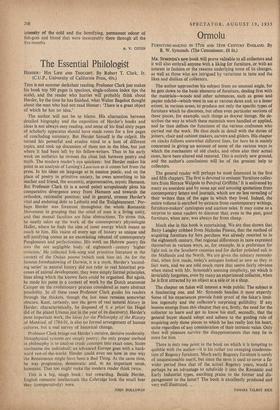CRISIS or no crisis, it is difficult enough at all
times to manage the British economy. Let us see what it involves. The difficulties must be opprzessing Mr. Butler, for not a word came from him after the Cabinet meeting on Monday which had been called, inter alia, to discuss our awkward (I must not say critical) economic situation. Mr. Roy Harrod, who was among the first to cry `inflation' towards the end of last year, now comes to Mr. Butler's defence in the financial press by saying that this is not a crisis of the old sort but a textbook case of an ordinary business boom which has gathered too much momentum and has to be checked by orthodox monetary re- straints. I agree with him that we cannot easily eradicate the tendency to boom and slump in an economy of -free enterprise. No really free economy ever stays long in equilibrium. It is either moving away from or towards a balance. But we ought to do better than we have done in correcting dis- equilibrium. It is not as if we have to deal with an entirely free and rumbustious economy. Controls are still on the statute book and all the heavy investment in- dustries are nationalised, except iron and steel, which is still amenable to State plan- ning. if the nationalised industries do not adjust themselves quickly enough to the national economic policy, then our control of them is at fault and should be put right. The Bank of England is nationalised, but if it cannot get its policy carried out quickly enough by the joint stock banks, then the Bank of England Act is faulty and should be revised. If our monetary action is not prompt and decisive enough because, as Mr. Harrod suggests, our statistical information is faulty, then it is up to the Treasury to improve its statistics. I remember Sir Stafford Cripps saying to me soon after he was appointed Chancellor that a State-planned economy could not be run without an adequate and efficient sta- tistical service, and that his first job as a Socialist Chancellor was to provide one. That was seven years ago. There is no reason today why we should not have as efficient a statistical service as that of the US Department of Commerce, whose monthly bulletin puts ours to shame. There is no reason, for that matter, why we should not have as efficient a financial system as the Federal Reserve system.
* * *
But even supposing that our technique for economic control were adequate for the occasion, can we really achieve the objec- tives which the Government has set for itself? Internally it wants to have full em- ployment, and Mr. Butler defined this in the last economic debate strictly enough to satisfy any Socialist. ('It is not the aim of HM Government,' he said, `so to conduct our financial policy that we cause a large section of our workpeople to become un- employed.') Externally, it wants to have a convertible or partly convertible £ at a fixed rate of exchange, which requires, of course, not only a balance in our inter- national payments but a surplus large enough to cover investment overseas. Can we really achieve both? Obviously we run
* *


































 Previous page
Previous page